Click on images for full size printable files


Click on images for full size printable files


Over the past few years, the JFTC2 campaign Committee has organised an annual seminar as part of the West Belfast feile an phobail. The purpose of this has been to provide contemporary information on our quest for justice. It has also afforded an opportunity to highlight other campaigns and groups such as ‘Joint Enterprise’ – not guilty by association who we partnered with last year before their much publicised victory in the Supreme court in England.
Despite the success of this event in previous years, regretfully we feel it impossible to continue this tradition. We believe the continued attendance of, and prominence afforded to the PSNI serves to sanitise that organisation and it’s role in our miscarriage of justice. The part they (PSNI) have played in manipulating witnesses and sabotaging legal processes as well as the targeting of our legal representatives, is well documented. We will not share in the pretence that the PSNI are a force for good when they have offered us and our families nothing but hurt.
We thank all those who have supported us in the past and we hope they will understand the position we have adopted.
Brendan McConville and John Paul Wootton
Maghaberry Gaol.
31/7/16
END
Statement from Craigavon Two.
John Paul Wootton and Brendan McConville would like to express their sincere gratitude to Brian Murphy and the IRPWA for the resourceful act of solidarity in Dublin on Thursday 26th May.
This gesture of support captured the attention of the media and briefly focused international attention on the miscarriage of justice which we along with our families and loved ones continue to endure.
Brian’s selfless action momentarily lifted the veil of silence that shrouds all muttering of impropriety in the six counties and give the world a glimpse of just a fraction of injustice that lies beneath. We call upon other individuals and organizations to follow Brian’s example and do what they can do to unlock the truth.
End.#JFTC2
Pictures are from protest at the Canadian Embassy.


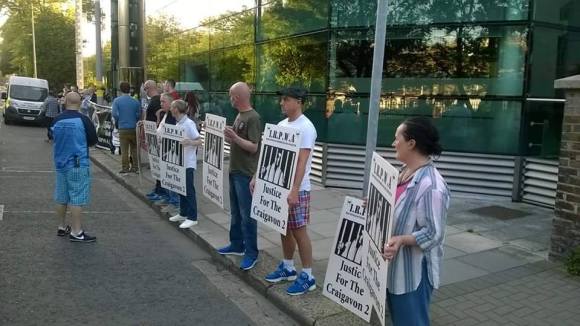

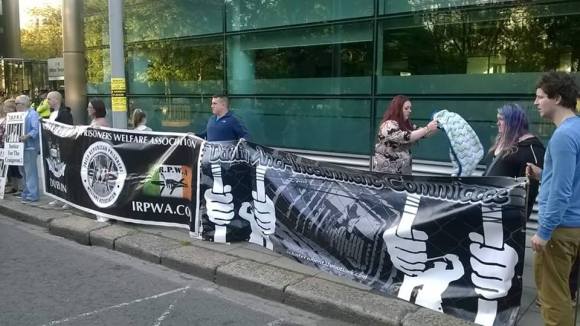
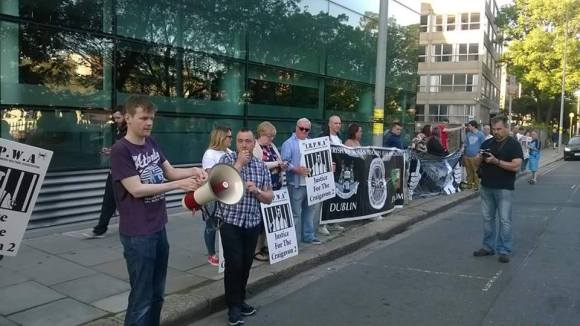

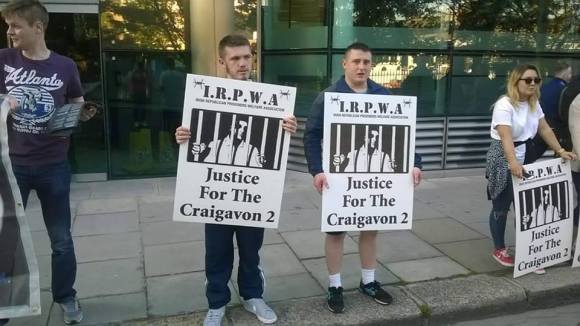
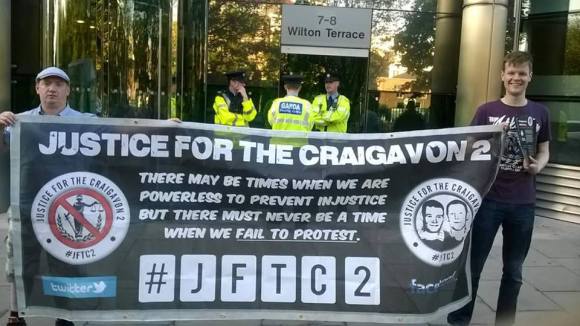

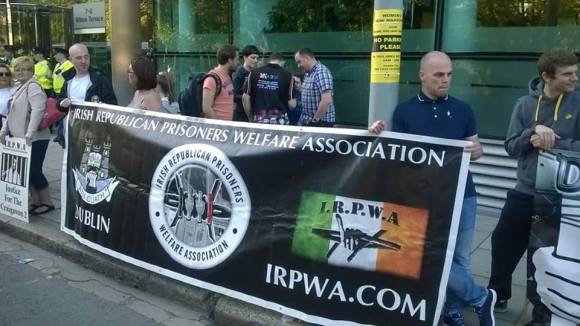

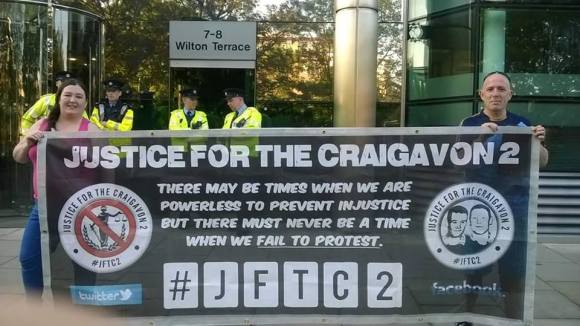
Save the date folks!! JFTC2 will be in the Rock Bar Belfast on the 24th June with music from Erin Go Bragh and other fantastic acts to be confirmed. Come along have some food, enjoy a great night of entertainment while helping to support the lads
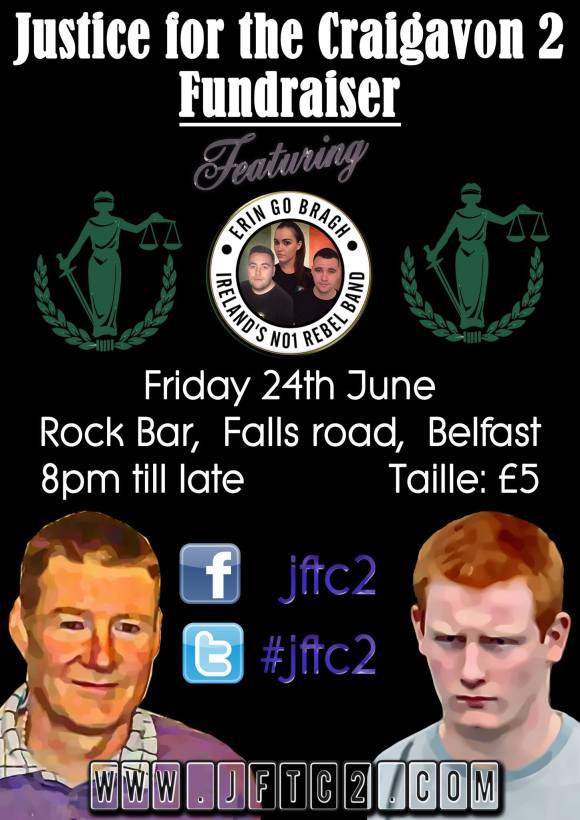
Just presented on the Craigavon Two case to American law students in Rosemount Resource Centre, Derry. #jftc2

Below is a letter from John-Paul Wootton of the Craigavon 2 in today’s Irish News.
It’s really sad reading John describing how he’s being imprisoned since he was 17 years old and missing out on so much of his life while behind bars for something he didn’t do.
Will you help John-Paul Wootton and Brendan McConville gain their freedom?

Yesterday on the 16th May 2016, family members of Brendan McConville and John-Paul Wootton took the Justice for the Craigavon Two campaign to 10 Downing Street and along with our friends from the campaign group JENGbA (Joint Enterprise Not Guilty by Association) demanded an immediate review on all cases of Joint Enterprise – including that of Brendan McConville and John Paul Wootton. Under joint enterprise legislation a person can be found guilty for another person’s crime, even though under criminal law it is generally only offenders that can be held liable for their actions. In February this year the Supreme Court in London ruled that the principle of joint enterprise had been wrongly interpreted for over thirty years. With so many innocent people, convicted under joint enterprise currently serving life in prisons across Britain and Ireland, we marched with JENGbA to Downing Street yesterday to put pressure upon the British government to review all cases of joint enterprise immediately. In the case of the Craigavon Two, a role has never been attributed to neither Brendan nor John Paul. Kate Carroll (wife of murdered PSNI Constable Stephen Carroll) even stated herself that she believed her husband’s killers were still not apprehended. Yet seven years later Brendan and John Paul are still in Maghaberry prison, serving life sentences for something someone else did. This cannot continue. This is a miscarriage of justice, this is Birmingham, Guildford and Woolwich all over again, this is a violation of human rights, this is an abuse of state power. This is injustice. #jftc2

#JFTC2 campaign members currently with #JENGBA outside Downing Street, highlighting miscarriages of justice via #JointEnterprise
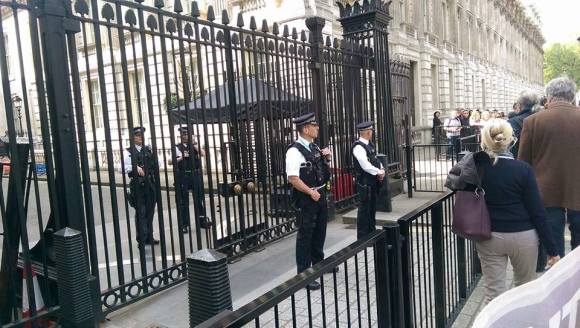
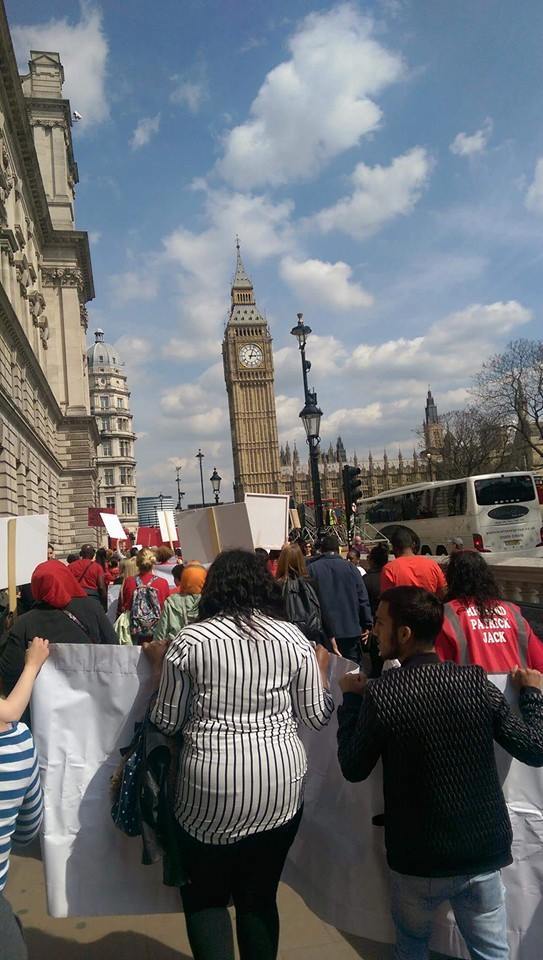
“The 25th anniversary of the release of the Birmingham Six should act as a clarion call: there are many innocent men and women languishing in prisons in the UK, who urgently need legal representation to turn the excruciatingly slow wheels of British justice.
We cannot let a miscarriage of justice to this scale ever happen again.”
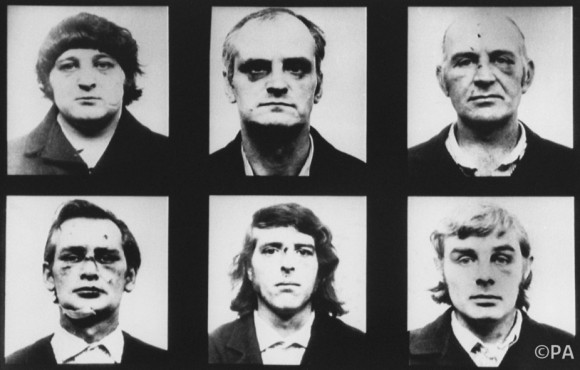
It is 25 years since the convictions of the Birmingham Six were quashed amid dramatic scenes at the Old Bailey in London.
Paddy Hill, Gerry Hunter, Johnny Walker, Hugh Callaghan, Richard McIlkenny and Billy Power had spent nearly 17 years in prison for crimes they had not committed, and are widely considered to be victims of one the most notorious miscarriages of justice in British history. However, despite efforts to prevent future wrongful convictions, we find that innocent people are still at great risk of suffering perhaps the greatest injury that the state can inflict on its citizens.
When the six were released in 1991, hot on the heels of other high profile miscarriages of justice such as the Guildford Four, it was hoped that lessons would be learned so that wrongful convictions do not happen again.

The Conservative government set about a root and branch reform of the criminal justice system, and the ensuing report of the Royal Commission on Criminal Justice made several recommendations for preventing and rectifying miscarriages of justice. However, the chair of the commission, Lord Runciman, has since admitted that no attempt at reform could completely eradicate wrongful convictions.
There are a whole host of reasons why people still find themselves wrongly accused and convicted of crimes. False allegations, especially those involving sexual offences, have resulted in the wrongful imprisonment of innocent people. Prosecutorial misconduct has led to suspects giving false confessions, as in the case of Paul Blackburn.
On occasion, inadequate defence by lawyers can mean that crucial evidence is sometimes missed. Additionally, the testimony of so-called experts can sway a jury to convict, even when the evidence provided does not stand up to scrutiny. In the cases of Sally Clark and Angela Cannings, expert evidence swayed the jury to believe that they had killed their babies, but subsequent research showed that the evidence used to convict them was so methodologically flawed that their convictions were clearly unsafe.

If we can’t prevent wrongful convictions from ever happening, how do we at least ensure that people do not end up spending years, sometimes decades, in prison when they shouldn’t be there?
The Runciman Commission recommended the establishment of the Criminal Cases Review Commission (CCRC). The Birmingham-based CCRC is an independent body with the remit of investigating possible miscarriages of justice and ensuring that appeals are submitted to the Court of Appeal swiftly. Since it began its work in 1997, the CCRC has referred 615 cases to the Court of Appeal, and of the 590 that have been heard, 404 appeals have been allowed.
In many respects, the work of the CCRC is to be commended. However, it is not the panacea for all the criminal justice system’s ills. The CCRC is inadequately funded, and lacks the resources to investigate every claim fully. In fact, their statutory remit means that they are not there to advocate on behalf of prisoners. They are charged with investigating claims, and making a decision as to whether or not there is a “real possibility” that the Court of Appeal would overturn the conviction.
This can be a real problem when we recognise that two out of three applicants to the CCRC have no legal representation, so their applications are not as rigorous as they might otherwise have been. Criminal appeals lawyers are poorly paid, with the result that many are unable or unwilling to take on cases that might sometimes run for years – especially when the bill is not settled until an appeal is finished.

In recent years, several new initiatives have been set up to assist alleged victims of miscarriages of justice put together their applications to the CCRC. Law schools across the country, including here at Birmingham, have also developed projects to investigate claims of wrongful conviction.
In 2014, Cardiff Law School’s Innocence Project oversaw the successful appeal of Dwaine George, who spent 12 years in prison for the shooting of 18-year-old Daniel Dale in Manchester before his release. Declaring the conviction “no longer safe” Sir Brian Leveson expressly praised the students who had worked so diligently on the appeal.
Earlier this year, the Centre for Criminal Appeals (CCA) received its legal aid contract, enabling it to provide legal assistance to prisoners who cannot afford the cost of a lawyer. The CCA was set up by people with experience of exonerating prisoners in the US, including those facing death sentences. Investigators and lawyers at the CCA emphasise the need for boots-on-the-ground investigation, to complement the desk-based work that has historically characterised criminal appeals work in England and Wales.
These initiatives work alongside campaigning organisations such as The Justice Gap, Inside Justice, and the numerous other groups that have been set up by family members of the incarcerated – but there is only so much that a few committed but poorly paid lawyers and investigators can do.
The 25th anniversary of the release of the Birmingham Six should act as a clarion call: there are many innocent men and women languishing in prisons in the UK, who urgently need legal representation to turn the excruciatingly slow wheels of British justice.
We cannot let a miscarriage of justice to this scale ever happen again.